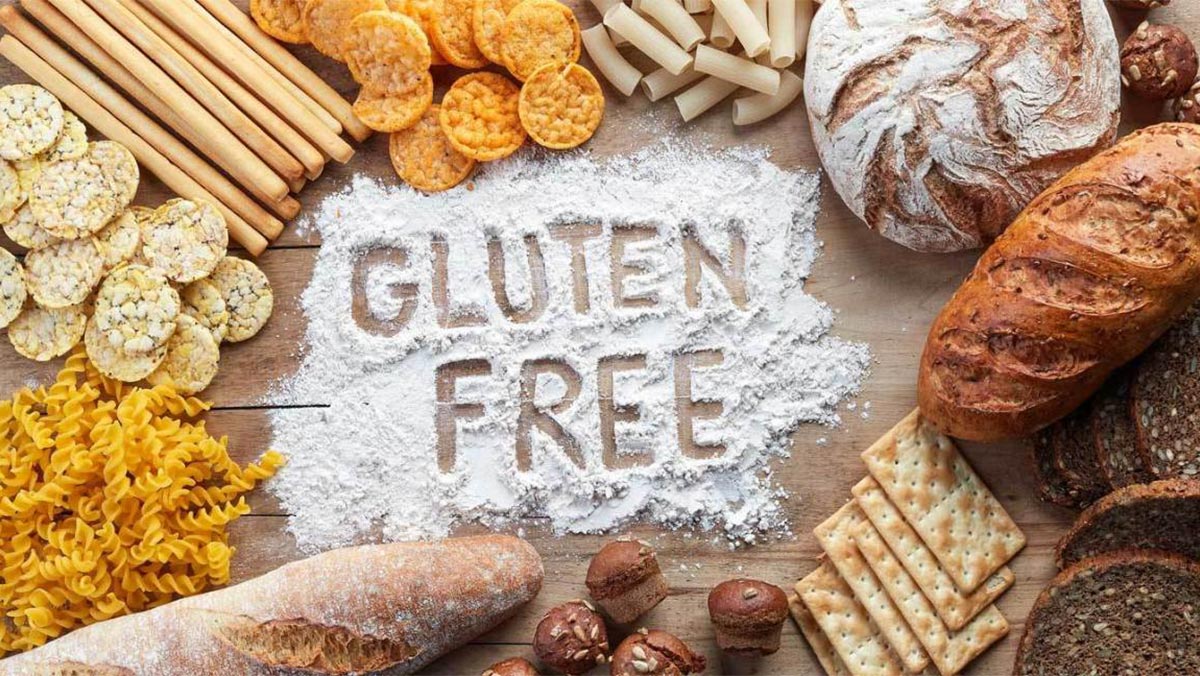Jan. 20, 2021

What Is Gluten?
Share on Pinterest
Gluten is a family of proteins found in wheat, barley, rye and spelt.
Its name comes from the Latin word for "glue," as it gives flour a sticky consistency when mixed with water.
This glue-like property helps gluten create a sticky network that gives bread the ability to rise when baked. It also gives bread a chewy and satisfying texture (3Trusted Source).
Unfortunately, many people feel uncomfortable after eating foods that contain gluten. The most severe reaction is called celiac disease.
Celiac disease is an autoimmune disorder in which the body mistakenly harms itself. Celiac disease affects up to 1% of the population and can damage the intestines (4Trusted Source).
If eating gluten makes you feel uncomfortable, it's best to tell your doctor.
These are the most common ways to test for celiac disease (5Trusted Source):
● Blood test. A blood test will look for antibodies that incorrectly interact with the gluten protein. The most common test is a tTG-IgA test.
● Biopsy from your small intestine. People with a positive blood test will likely need to have a biopsy. This is a process in which a small tissue sample is taken from your intestine and checked for damage.
It's best to get tested for celiac disease before trying a gluten-free diet. Otherwise, it will become hard for your doctor to tell if you have celiac disease or not.
People who don't have celiac disease but feel they may be sensitive to gluten can try a strict gluten-free diet for a few weeks to see if their symptoms improve. Be sure to seek assistance from a doctor or dietitian.
After a few weeks, you can re-introduce foods that contain gluten into your diet and test for symptoms. If a gluten-free diet doesn't help your symptoms, it is likely that something else is causing your digestive problems.
Foods to Eat
There are plenty of gluten-free options that will allow you to enjoy healthy and delicious meals.
The following foods are naturally gluten-free:
● Grains. Quinoa, rice, buckwheat, tapioca, sorghum, corn, millet, amaranth, arrowroot, teff and oats (if labeled gluten-free).
● Meats and fish. All meats and fish, except battered or coated meats.
● Eggs. All types of eggs are naturally gluten-free.
● Dairy. Plain dairy products, such as plain milk, plain yogurt and cheeses. However, flavored dairy products may have added ingredients that contain gluten, so you will need to read the food labels.
● Fruits and vegetables. All fruits and vegetables are naturally free of gluten.
● Starches and flours. Potatoes, potato flour, corn, corn flour, chickpea flour, soy flour, almond meal/flour, coconut flour and tapioca flour.
● Nuts and seeds. All nuts and seeds.
● Spreads and oils. All vegetable oils and butter.
● Herbs and spices. All herbs and spices.
● Beverages. Most beverages, except for beer (unless labeled as gluten-free).
If you're ever unsure if a food item contains gluten, it's best to read the food labels.
Health Benefits of a Gluten-Free Diet
A gluten-free diet has many benefits, especially for someone with celiac disease.
Here are the main benefits of a gluten-free diet:
May Relieve Digestive Symptoms
Most people try a gluten-free diet to treat digestive problems.
These include bloating, diarrhea or constipation, gas, fatigue and many other symptoms.
Studies have shown that following a gluten-free diet can help ease digestive symptoms for people with celiac disease and non-celiac gluten sensitivity (13Trusted Source, 14Trusted Source).
In one study, 215 people with celiac disease followed a gluten-free diet for six months. The diet helped significantly reduce stomach pain and the frequency of diarrhea, nausea and other symptoms (15Trusted Source).
Can Reduce Chronic Inflammation in Those With Celiac Disease
Several studies have shown that a gluten-free diet can reduce markers of inflammation like antibody levels. It can also help treat gut damage caused by gluten-related inflammation in those with celiac disease (17Trusted Source, 18Trusted Source).
People with non-celiac gluten-sensitivity may also have low levels of inflammation. However, it's not completely clear if a gluten-free diet can reduce inflammation in these people (19Trusted Source).
May Boost Energy
People with celiac disease often feel tired, sluggish or experience "brain fog" (20Trusted Source, 21Trusted Source).
These symptoms may be caused by nutrient deficiencies because of damage to the gut. For example, an iron deficiency can lead to anemia, which is common in celiac disease (22Trusted Source).
If you have celiac disease, switching to a gluten-free diet may help boost your energy levels and stop you from feeling tired and sluggish (13Trusted Source).
In a study including 1,031 people with celiac disease, 66% of them complained of fatigue. After following a gluten-free diet, only 22% of people still experienced fatigue (23Trusted Source).
Can Help You Lose Weight
It's not unusual to lose weight when you start following a gluten-free diet.
This is because it eliminates many junk foods that add unwanted calories to the diet. These foods are often replaced by fruit, veggies and lean proteins.
However, it's important to avoid processed "gluten-free" foods like cakes, pastries and snacks, as they can quickly add a lot of calories to your diet (24Trusted Source).
Focus on eating plenty of whole, unprocessed foods like fruits, veggies and lean proteins.
Tel.: +86 411 88039787
E-mail: info@wholefoodglutenfree.com
Add.: No.39-2-1-2, Gangxing Street, Development District, Dalian, Liaoning, China
Follow Us
